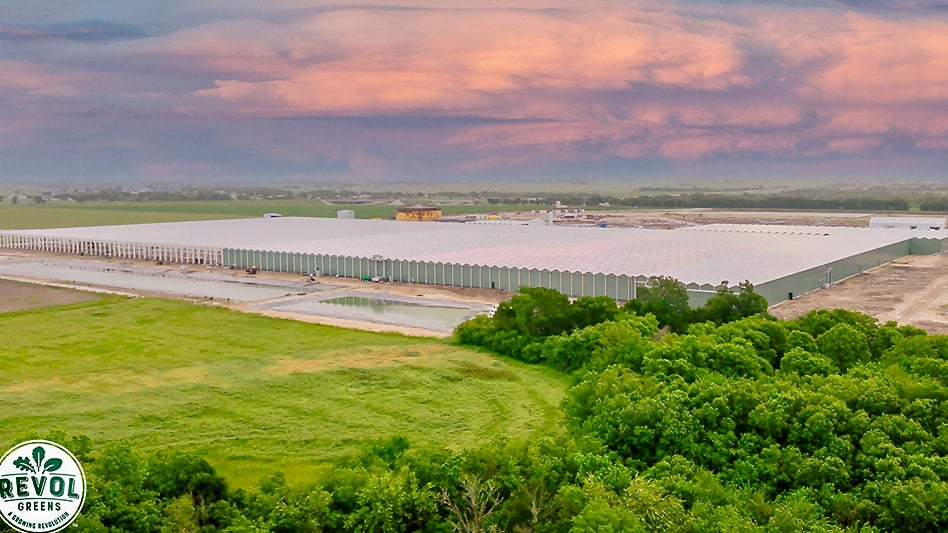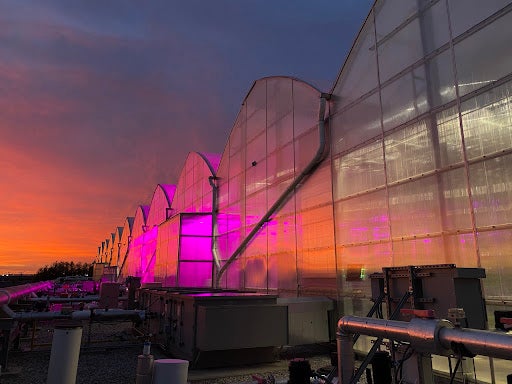
Borderlands: Texas vertical farms designed to disrupt fresh produce supply chains
Vertical Greenhouses | Noi Mahoney |
IMAGE: Eden Green Technology operates a vertical greenhouse farm in Cleburne Texas, supplying 2 million pounds of whole head lettuce per year to customers. (Photo: Eden Green Technology)
Texas vertical farms designed to disrupt fresh produce supply chains
Eden Green Technology aims to revolutionize the fresh produce supply chain using indoor vertical farming.
The farming technology company is based in Cleburne, Texas, just outside the Dallas-Fort Worth metroplex. Eden Green Technology operates a vertical greenhouse near a large Walmart distribution center that supplies more than 400 stores in Texas and Oklahoma.
“What we do is we combine the best of both worlds in terms of controlled environment agriculture (CEA). We combine the density of a vertical farm but we’re in a greenhouse; 80% to 90% of our plants’ needs in terms of light come through the sun,” Eddy Badrina, CEO of Eden Green Technology, told FreightWaves.
Badrina said about 90% of the country’s lettuce comes from California’s Salinas and Imperial valleys and Yuma, Arizona — meaning that almost all of the lettuce eaten by consumers on the East Coast has traveled more than 3,000 miles.
Eden Green’s facility is capable of growing 2 million pounds of lettuce per year. The company also grows an array of other fresh produce and herbs, including cilantro, mint, peppers, peas, tomatoes and cucumbers.
Robinson Fresh, a nationwide provider of fresh produce and supply chain services, is the distributor of Eden Green’s produce. As part of its offerings, Eden Green is supplying romaine and butterhead lettuce under the Robinson Fresh brand to some of the largest retailers in the U.S.
“We’re able to do greenhouse farming very efficiently and also able to provide it very affordably to the average consumer,” Badrina said. “From a distribution standpoint, an aspect of our affordability is the fact that we can place our greenhouses right next to distribution centers, virtually eliminating the supply chain costs.”
Eden Green Technology currently has two vertical greenhouses totaling more than 100,000 square feet of grow space. The company is also in the process of building two additional facilities to double its capacity by the end of the year.
Eden Green Technology is not the only CEA company making big moves in the Lone Star State. In May, Revol Greensopened what company officials said is the world’s single-largest CEA lettuce facility ever built. The facility is located in Temple, Texas, about 70 miles north of Austin.
The Temple facility is expected to significantly expand Revol Green’s distribution in Texas as well as the central and southern United States, according to a news release.
“We are on a mission to provide fresh, affordable lettuce to consumers across the country,” Michael Wainscott, CEO of Revol Greens, said in a statement. “The addition of the Temple facility opens new markets, allowing for further reduction of food miles typically traveled within the U.S. salad market.”
Minnesota-based Revol Greens also has existing greenhouse operations in Owatonna, Minnesota; Athens, Georgia; and Tehachapi, California. The company has distribution partnerships with H-E-B, Sprouts, Costco, Walmart, Kroger, Target, United Supermarket and Amazon Fresh.
Officials for Revol Greens did not respond to a request for comment from FreightWaves.

Compared to traditional farms, Badrina said Eden Green can grow produce faster and more efficiently. For a head of lettuce, the company can grow it from a seed and have it harvested within 24 to 28 days.
“In Salinas Valley, if you were to grow a head of lettuce, it would take 65 to 90 days, maybe more. It would involve a lot of pesticides, herbicides, fungicides and then in the amount of 30 gallons of water per head of lettuce,” Badrina said. “In contrast, we’ll go from seed to harvest in 28 days, and we’re bumping that actually down to 24 as we speak. It will go from seed to packaging in literally 1,500 feet and then from pack into cold storage in 20 minutes, all the while only using two and a half gallons of water as opposed to 30 gallons.”
The founders of Eden Green are South African brothers Eugene and Jacques van Buuren. The van Buuren brothers were already living in the Dallas area when they founded the company in 2017.
Badrina said the van Buuren brothers chose the site in Cleburne because of its proximity to the Walmart distribution center.
“They established it there because they knew in their minds a retailer like Walmart is someone they would want to pursue as a customer,” Badrino said. “As we expand our decentralized network, we do want to be within striking distance or even adjacent to distribution centers — because we need labor, we need access to trucking lanes and we need efficiency in terms of land. That’s why we chose Cleburne and why our future plans dictate that we will be in and around distribution centers across the United States.”

Original Article: https://www.freightwaves.com/news/borderlands-texas-vertical-farms-designed-to-disrupt-fresh-produce-supply-chains



